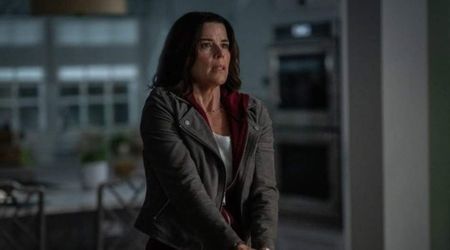'The Plagues of Breslau' Review: A good old-fashioned psychological thriller that hits all the right notes

Spoilers for 'The Plagues of Breslau'
Psychological thrillers worth their salt need to be bleak. They need to delve into the darkest parts of human behavior. And they need to move past the traditional cinematic need for closure. ‘The Plagues of Breslau’ or ‘Plagi Breslau’, on Netflix lives up to these expectations and then some.
The Polish crime thriller may seem like it is made of usual tropes — a sullen cop with darkness in her heart, a series of inexplicable murders, and a killer with a taste for public spectacles. But tropes don’t feel tiring when the execution is skillful. Take for example the protagonist. Malgorzata Kozuchowska as Helena is a cold, foul-mouthed, leather jacket-wearing homicide cop. The film takes the effort to set up Helena’s personality without revealing too much about her past. She’s depressed, brusque, and she is a hell of a good detective.
Helena’s motivation for solving crimes is not to help anyone, but to satiate an underlying need to secure justice (though not always in the right sense of the word) stems from traumas of her past — the death of her fiance in a drunk driving incident where the driver walked scot-free. And in Magda (Daria Widawska), a senior federal policewoman, she finds an ideological match. Widawska’s performance is equally enthralling, but we’ll get to that later.
The story begins with a murder and a gruesome one at that. A man is sewn up inside a cowhide and he dies from the pressure of the hide shrinking and respiratory failure. The man has the word “Degenerate” branded to his skin. He is the first on multiple victims, all branded with a different sin of sorts and all made spectacles of.
If you’re thinking of David Fincher’s cult classic ‘Se7en’, you’re not off the mark here. The film has a somewhat similar feel to it. One can only assume, but from the looks of it, filmmaker Patryk Vega intended for ‘Plagues of Breslau’ to be a pastiche of Fincher’s classic.
Another similarity (of sorts) the two films bear is more in terms of the aesthetic and visuals. Dark, musty, and unnervingly unshy of presenting the gruesome — and, of course, a severed head presented as a gift. ‘Plagues of Breslau’ is by no means a gorefest. But when it comes to showing the crimes, it goes the extra mile to make them look realistic — blood, bones, and the works.
A good thriller can never be so without a good motive and this film does an above-average job of providing that. Sure, in the grander scheme of things, disillusionment with hierarchies of power and systems of apathy may not seem like the best of motives, but the film, especially through Widawska’s power-packed performance, makes it work.
In that respect, the film is a pastiche to yet another psychological thriller from the ‘90s: Erik Skjoldbjærg’s 1997 Norwegian thriller ‘Insomnia’ (that was later remade by Christopher Nolan in 2002 for American audiences) that focuses on the intimate relationship between the cop and the criminal in an unusual setting. Without giving too much away, ‘Plagues of Breslau’ too examines that dynamic and does a pretty good job of it.
The film’s no work of art. But it is pulpy. It is gripping. And for fans of dark gothic thrillers, it makes for an enjoyable watch, offering twists and turns, gore, and characters that rely more on body language than cheesy dialogue to drive the message home.
‘The Plagues of Breslau’ is available for viewing on Netflix.










